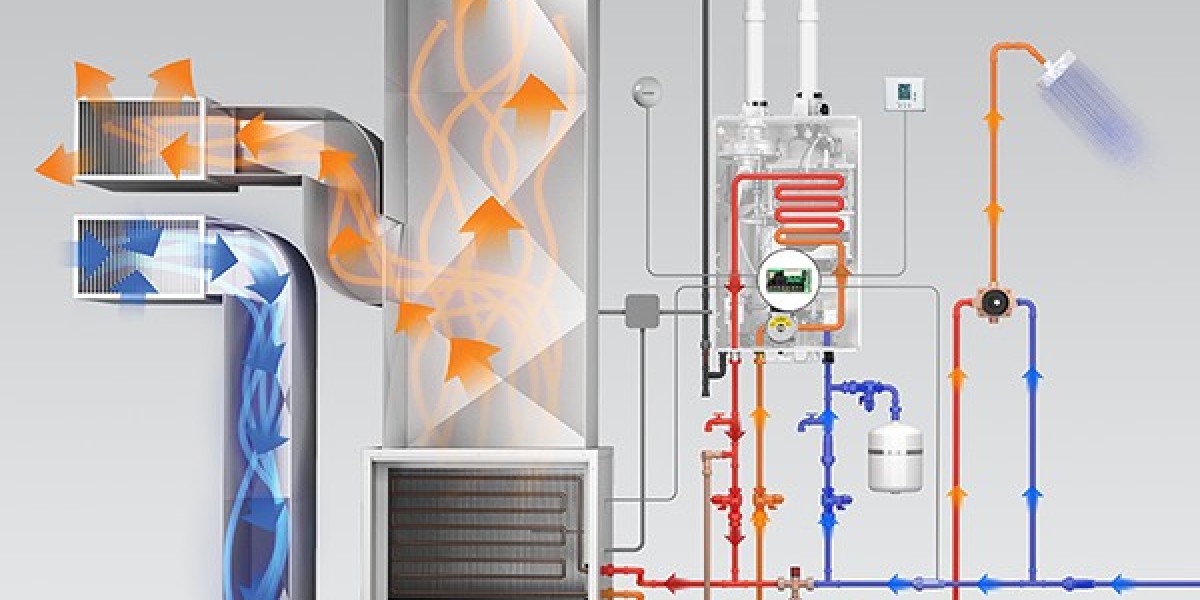Homeowners often seek a balance between efficiency, space-saving design, and consistent hot water supply for their homes. Boilers with tankless coils offer a unique solution, especially suited to homes with lower hot water demand or limited space.
Combining heating and hot water production in a single, compact system, these boilers are a practical choice for many households. In this article, we’ll explore how boilers with tankless coils work, their advantages and disadvantages, and why they might be the right fit for your home.
How Boilers with Tankless Coils Work
Boilers with tankless coils differ from conventional water heaters and traditional tank-based boilers in one key way: they produce hot water on demand. Rather than storing hot water in a tank, they use a coil system to heat water instantly whenever there’s a call for it.
The process is fairly straightforward:
The boiler heats up: Like other boilers, it heats water for space heating, using oil, gas, or electricity as fuel.
Water passes through a tankless coil: Cold water enters the coil, a tube or series of tubes located within the boiler’s main heat exchanger.
Instant heating: As the water flows through the coil, it absorbs heat from the boiler, quickly reaching the desired temperature.
Immediate delivery: The hot water flows directly to your faucet, shower, or appliance without needing to be stored in a tank.
This on-demand hot water delivery helps conserve energy, as it only heats water when needed, unlike traditional systems that maintain a tank of hot water around the clock.
Advantages of Boilers with Tankless Coils
Space-Saving Design
Boilers with tankless coils eliminate the need for a separate water heater or a bulky storage tank, freeing up valuable space. This makes them ideal for smaller homes, apartments, or any area with limited room for large appliances.
Energy Efficiency
By producing hot water only when needed, tankless coils minimize standby energy losses common with conventional storage water heaters. The system can be highly efficient, especially if the boiler runs frequently during the heating season.
On-Demand Hot Water
Tankless coils provide hot water on demand, so you don’t have to worry about running out of hot water as you might with a tanked system. This setup is particularly advantageous for small families or individuals with intermittent hot water needs.
Lower Installation Costs
Integrating heating and hot water into a single appliance can reduce installation costs compared to installing separate heating and water heating systems.
Simplified Maintenance
With fewer components than some traditional systems, boilers with tankless coils often require less frequent maintenance. Additionally, there’s no need for tank flushing, which is common in storage tank systems.
Potential Drawbacks of Boilers with Tankless Coils
Limited Hot Water Output
While tankless coils provide hot water on demand, the output rate can be limited compared to larger systems, especially if the boiler is not actively running. During warmer months, when heating demands are lower, the boiler may struggle to provide ample hot water without cycling on frequently.
Efficiency Drops in Off-Seasons
The system’s efficiency can drop in seasons when you don’t use home heating as much. Since the boiler must cycle on just to heat water, you may experience higher energy costs during summer when space heating isn’t necessary.
Temperature Inconsistency
Hot water temperature can vary depending on the heating load and usage patterns. For instance, if you’re running hot water while the boiler is actively heating the home, water temperatures may be more consistent, but otherwise, they could fluctuate.
Dependence on Boiler Condition
Because the tankless coil depends on the boiler, if the boiler malfunctions, both your heating and hot water supply can be affected. Regular maintenance of the boiler becomes critical to prevent breakdowns.
Ideal Applications for Boilers with Tankless Coils
Boilers with tankless coils work best in situations where:
Hot water demand is moderate: These systems are ideal for smaller households or those who don’t require high volumes of hot water simultaneously (e.g., running multiple showers at once).
Limited space is available: For homes with tight utility space, the compact nature of a boiler with a tankless coil provides both heating and hot water without the need for separate systems.
Cold climates: In areas with long heating seasons, the boiler runs often enough to support efficient hot water production without frequent cycling just for hot water.
Energy cost management is a priority: Homeowners seeking to minimize standby energy losses or installation costs may find this a cost-effective solution.
Tips for Optimizing Boilers with Tankless Coils
Routine Maintenance
Regular boiler maintenance is key to ensuring reliable performance and extending the lifespan of the system. Schedule annual inspections to check for issues, particularly with the heat exchanger and tankless coil.
Insulate Hot Water Pipes
Insulating pipes can help maintain water temperature as it travels from the boiler to the point of use, helping reduce energy loss and increasing comfort.
Use a Flow Control Valve
Installing a flow control valve can help regulate water flow through the tankless coil, ensuring water is heated effectively even at low demand levels.
Install a Mixing Valve
A thermostatic mixing valve can help stabilize water temperature, blending hot water from the tankless coil with cold water to prevent fluctuations and enhance comfort.
Final Thoughts
Boilers with tankless coils offer a compact and efficient solution for homes with lower hot water demands or limited space. While there are some limitations in terms of hot water output and seasonal efficiency, these systems are a viable choice for households looking for on-demand hot water without the bulk and cost of traditional water heaters.
For the right household, this combination heating and hot water solution provides both convenience and energy savings, making it a smart choice for efficient home heating and water needs.










